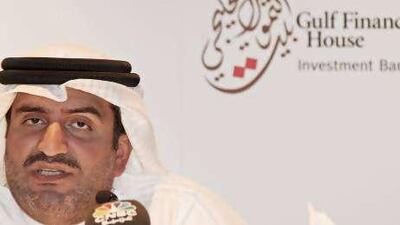Bahrain's Gulf Finance House (GFH) yesterday posted its seventh straight quarterly loss, ending the April-June period about US$40 million (Dh146.9m) deeper in the red. The second-quarter loss was smaller than the $54.4m loss recorded in the same period last year. But it took the cumulative loss to $786.6m since the final quarter of 2008.
GFH's business virtually ground to a halt when the financial crisis hit the region. Many of its competitors in Bahrain and Kuwait - Global Investment House (GIH) and The Investment Dar among them - suffered a similar fate. GFH was caught with exposures to huge industrial property projects in India, Jordan, Bahrain and Morocco and with a funding model that relied on short-term and medium-term debt. When world credit markets froze and investor appetite for Gulf corporate debt dwindled, the company found itself in a liquidity crisis.
Ted Pretty, an Australian with expertise in reorganisations, was brought in to turn things around. Mr Pretty, now the chief executive of GFH, is leading a drive to restructure and reduce debts and phase in a new business model under which the company plans to seed Islamic financial institutions across the Middle East. "On all counts, we are making real progress and continue to do so," Mr Pretty said yesterday. "Like every global investment bank, GFH has had to review its business model, adjust its liquidity profile and reassess its investment projects. GFH's recovery plan and new strategy will position a stronger GFH to capture the potential value of Islamic finance across the region and beyond for the benefit of investors, shareholders and customers."
GFH is trying to deal with debts before it embarks fully on its new strategy. The company began to address the issue this year when it reached an agreement with bankers to repay two thirds of a $300m loan that came due in February. The remaining $100m was supposed to be repaid this month, but the company received a repayment extension of up to three years. GFH also reached an agreement with bankers to extend repayment of another $100m of debt.
The company plans to raise cash for debt payments by selling assets and cutting expenses. It has already pared its staff, and Mr Pretty said earlier this year he hoped to raise $250m from asset sales. The sale of its 49.9 per cent stake in Bahrain Financial Harbour, a collection of office towers in the centre of Manama, was completed this week. Raising more capital may also be on the cards for GFH as it tries to put itself on a firmer financial footing, executives have said.
"Our half-year results demonstrate the progress GFH has made in taking good steps in the implementation its recovery plan," said Esam Janahi, the company's chairman. "Our focus now will be on strengthening the capital structure of GFH and working towards our new business model." GFH was one of the hardest-hit of the region's financial companies during the global financial crisis. Also badly affected were the Kuwaiti firms GIH, which entered into a restructuring arrangement last year covering $1.7 billion of debt, and The Investment Dar, which is in the middle of a $3.5bn restructuring.
All of those companies have tried to sell assets, reduce debt and refocus on fee-generating businesses. GFH said yesterday the book value of its assets fell to $1.4bn at the end of June from $2.7bn at the same point last year. It also reduced overall debt from $625.5m at the end of last year to $412m at the end of June. GFH is listed in Bahrain, Dubai, Kuwait and London. Trading in its shares has been suspended in each location since it failed to report financial results by Sunday's deadline.
@Email:afitch@thenational.ae

